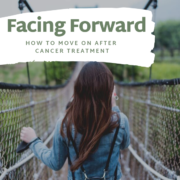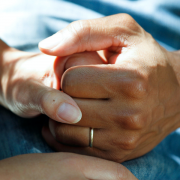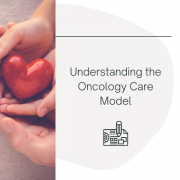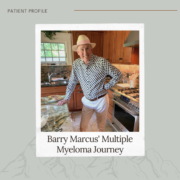Facing Forward: How to Move On After Cancer Treatment
When you go through something as stressful, traumatizing, and life-altering as cancer, you may come out on the other end of the tunnel feeling like you were just put through the spin cycle. There’s no “normal” way to respond to a cancer diagnosis, treatment, or remission prognosis, and you should never force yourself into taking on one specific emotion or perspective. You may feel angry, sad, scared, hopeful, or joyous, and all are perfectly acceptable responses to have.
Regardless of how the experience left you feeling, it’s important to work at moving on and processing it in a healthy way. Here are a few ways to help you do it.
Measure Your Mental Health
You’ve spent the last several months or years caring for your body to the point of exhaustion. Now it’s your brain’s turn. Depression, anxiety, post-traumatic stress, and cancer fears are quite common among survivors. In fact, between 18 and 20 percent of adult cancer survivors report symptoms of anxiety[1], while almost 80 percent of survivors experience some level of fear of recurrence. It’s vital that cancer survivors and patients alike are constantly looking inward and taking daily measurements of mood and general well-being. If you experience any persistent, negative feelings, be sure to seek out advice from a licensed mental health professional.
Focus on Daily Self-Care
Because your daily life was thrown completely off track during treatment, it can be hard to settle back into a healthy routine when it’s all over. Implementing certain self-care practices into your day-to-day life can help you stay mindful and prevent you from slipping into prolonged states of anxiety or depression. It will help you immensely to pick up healthy self-care practices, such as yoga, meditation, or long evening baths. Integrating weekly or bi-weekly social time will also help quite a bit, especially if you’re spending time with people who share similar interests or experiences.
Work on Rebuilding Self-Confidence
Though we’re ever-grateful that they exist (and save thousands of lives each year), chemotherapy, surgery, and radiation take a massive toll on our bodies. They leave us looking and feeling burnt out and exhausted, often grinding the last little bit of self-confidence we have into a sad, lifeless pulp. Even if you’ve never been a particularly vain person, your life post-cancer is time to help you regain your self-worth at every turn, and it’s perfectly okay to spend some time making yourself feel beautiful both inside and out! Here are some great ways to do it:
Regrow a Full Head of Hair
If you lost your hair during chemotherapy, there are a few cutting-edge hair loss treatments to consider. Though they’ve only been cleared to treat hair loss due to androgenetic alopecia by the FDA, many people find that low-level laser therapy devices help hair to grow back [2] quicker and healthier after treatment. Luckily, while it takes a little bit of time, most cancer patients are able to fully grow back their hair.
Work on Getting Back to a Healthy Weight
Cancer patients know that the constant barrage of chemicals and harsh treatments can seriously mess with our weight. Weight loss is one of the most common symptoms of both cancer and treatment, with between 40 and 80 percent of patients reporting weight loss [3] and cachexia (wasting) from diagnosis to advanced treatment. Working with your doctor or a dietician will help you return to a healthy weight in a safe way. He or she will design a diet and, if needed, prescribe medication to help you manage your weight.
Treat Your Skin and Nails
Hair isn’t the only physical feature that takes a beating during the treatment process. Chemotherapy and radiation can leave skin red, dry, itchy, or discolored, and it tends to leave nails cracked, infected, or yellow. A full-blown spa day is in order after you’ve recovered from your final treatment. Make sure to also see a dermatologist, especially if you’ve seen any serious changes in your skin since you were diagnosed.
Connect with Other Survivors
Building up a strong social network is vital to staying happy and positive post-cancer, and nobody will help you get there faster than fellow survivors. Like anything on this list, make sure you ease into it and wait until you’re fully ready. Having to recount your experience before you’ve fully processed it can worsen symptoms of post-traumatic stress, depression, and anxiety. But, after a period of time, it will help you feel stronger and more secure when you have a group of friends or family members to share your experience with. You can use the American Cancer Society’s resources database [4] to find specific support groups in your area.
Get Enough Exercise
Medical experts consistently say that exercise is among the most important components of a healthy life during and after cancer. One of the biggest reasons for this is that, though it sounds counterintuitive, getting physical can help reduce the ever-present cancer fatigue while also helping you get better sleep, reducing symptoms of depression and anxiety, and helping you build back muscle strength that may have deteriorated during treatment. Just be sure to follow all medical advice as you ease back into exercise, especially if you’ve recently had surgery.
Volunteer for a Research Foundation
If you’re experiencing any feelings of sadness, anger, or hopelessness, it can really help you to get involved in cancer-specific organizations that donate to research efforts. Finding a cure or at least more viable treatment options for this devastating disease is certainly on the horizon, but getting there takes a lot of money, resources, and effort. Getting involved can help you connect with other survivors and hopeful people, which will lead you into a deeper state of happiness and optimism.
Let Yourself Experience Loss, Pain, and Joy
Again, there’s no “correct” way to experience cancer, no matter if you’ve just been diagnosed or have just finished your final round of treatment. The most important thing you can do is to constantly take stock of your feelings, being careful not to suppress them, and do everything you can to stay healthy both mentally and physically every step of the way.
References:
[1] https://www.ncbi.nlm.nih.gov/pmc/articles/PMC5915316/
[2] https://www.capillus.com/blog/a-skeptic%E2%80%99s-guide-to-understanding-how-a-laser-hair-cap-helps-regrow-hair/
[3] https://www.cancer.net/coping-with-cancer/physical-emotional-and-social-effects-cancer/managing-physical-side-effects/weight-loss
[4] https://www.cancer.org/treatment/support-programs-and-services/resource-search.html
Shane McCarthy is the Content Director for Capillus, the world’s first, clinically-proven, FDA-cleared laser cap to treat hair loss. Shane works to share informative and engaging content based off of the struggles and prevention of adult hair loss and thinning. In his free time, he enjoys spending time out on the water wakeboarding and fishing.










